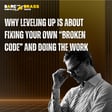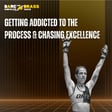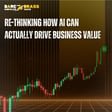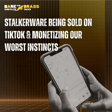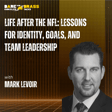Grabbing Attention vs. Data-Driven Strategies
00:00:00
Speaker
Like how do we get the market's attention? And I think we've kind of over rotated in the last five to 10 years as we've all become like obsessed with saying data driven on like the data driven stuff and that, you know, lever pulling to optimize and and it's important. But again, if you don't get attention, that stuff doesn't matter because you can have all the data in the world. If you don't know how to go tell a story and get your audience's attention, build trust with your audience,
00:00:26
Speaker
It doesn't matter you know what what data you have or don't have.
Introduction to the Podcast and Guest
00:00:37
Speaker
Yo, yo, yo, it's the show. This is Bare Knuckles and Brass Tax, the cybersecurity podcast that tackles the human side of cyber, buying, selling, trust, respect, and everything in between. I'm George Kay on the vendor side. And I'm George, a Chief Information Security Officer.
00:00:53
Speaker
And today our guest is Don Jeter, CMO at TORQ, which stands for Chief Memelord Officer. What a blast this
TORQ's Unique Marketing Approach
00:01:03
Speaker
guy was. Had a lot of fun talking about TORQ's very unorthodox approach to cybersecurity marketing and their Gertner campaign in particular. There's a lot of juice here for understanding how to approach a market that is just a lot of yawns and sameness.
00:01:20
Speaker
Don is really, really good at understanding the pulse of internet culture nowadays and he's really provided some good advice to our listeners on you know how to actually stay attuned with the target market and and how to break the matrix of SAS 2.0 marketing because I think you know that's And that's really what we're trying to escape from when we bring on guests like Don is how do we not make this boring and how do we make this engaging for people so the message actually gets out?
Balancing Creative Branding and Technical Expertise
00:01:52
Speaker
I think Don really is, he's at the forefront of ah doing marketing better in this generation.
00:01:59
Speaker
Yeah, a lot of juice here for founders. We've talked a lot recently about the capacity for storytelling narrative. Just have a strong point of view rather than looking over your shoulder and trying to ah copy everything that came before you. So the great thing though is the balance of art and science is not all fun and games. He talks very clearly about how they can back it up with technical expertise and how to balance that. But I think one thing that really stood out to me was also he recognizes in himself that he's got the creative flow on the brand side and he surrounds himself with the technical expertise.
Humor and Authenticity in Marketing
00:02:34
Speaker
I think it's rare these days that somebody doesn't believe that they just have a vision for all the things rather than the self-awareness like I might be good at this thing and just hire these other people. Yep, you betcha. Don Cernan was on point today.
00:02:49
Speaker
Don Jeter, welcome to Bare Knuckles and Brass Techs. Thanks for having me, guys, excited for the conversation. All right. Well, you are CMO at Torque. You are firmly in the vendor camp, which means that the CISO gets first crack. So over to you, George A.
00:03:05
Speaker
Awesome, Don, good to talk to you. Good to meet you, yeah. I got to ask you, man, not to bust your balls right off the bat, but meme-lord or marketer? Like, what exactly are you? Yeah, I think, yeah, I say chief meme officer all the time, chief menace officer. You know, yeah, I think it's all interchangeable on merch. You know, I got my torque chainsaw trucker on. Merch is a big part of the strategy. So all of the above, I think.
00:03:32
Speaker
So I got to ask you then, what actually inspired you to take a chance at being genuinely funny and like kind of awesome about it? Like, how did you how did you defeat the matrix of SAS 2.0 marketing? Because you guys are kind of like the liquid death of cyber. Oh, that was so allergy. Yeah, totally. um And yeah, thank thank those are kind words. um So
Alignment and Risks in Bold Strategies
00:03:56
Speaker
thank you. But I think the alignment from the beginning with Our CEO, our founders, and then also the board like it was a long process for me to join torque and I was super excited about it but it was like a year in discussions with our CEO and him exposing me to the board, and from the very beginning just
00:04:18
Speaker
almost over communicating what the strategy would be and the playbook would be. And this was back in 2022 and I actually referenced, you know, liquid death as an, as a point of inspiration to say the water category is extremely boring. And this is almost a case study in brand and positioning and packaging and mentioned like When you look at cybersecurity, when you walk RSA floor, when you walk the black hat floor, when you look at websites, a lot of this stuff is pretty similar and it looks the same and it sounds the same. And so there's an opportunity to differentiate through brand identity and tone.
Critique of Cybersecurity Marketing
00:04:56
Speaker
And so I think alignment is the key to to doing this stuff and you need to get by in early like because there is risk, no doubt.
00:05:05
Speaker
Yeah, yeah. So um this is the bare knuckles portion of the show, aka the airing of grievances. So you've begun to allude a little bit to this, but I would like to give you more space to talk about what you see as the state of marketing and cyber and why or how that kind of propels the unorthodox approach that you've taken. because i Let me just lay it out as like a preface to this for the listeners. Marketing generally in cyber, and I refer to the SAS 2.0 era, is absolutely boring and uninspiring and everything just seems like a melting pot of the same type of body. Yeah, it's a lot of copycatism.
00:05:45
Speaker
Right. Like I've worked with a lot of startups that sort of look over their shoulder and they're like, well, CrowdStrike is doing this and will want to do that. First of all, you don't have their money. So stop doing that. Good luck. Good luck competing with them on on on certain fronts for sure. Yeah. But also like, yeah, anyway, less of me talking more of you just want to give
Role of Brand in Driving Demand
00:06:04
Speaker
you that. But what's the state of marketing as you see it?
00:06:08
Speaker
No, I think that's spot on what you said, George, I think. And I saw a lot of the same things. And this is in a number of different industries. There is a lot of, I think, fear around taking chances. um And marketing like 101,
00:06:26
Speaker
right, is about differentiation. And I think we think about differentiation as it relates to product a lot. How is my product better? How is it different? What are the features and functions that make it better and different? And let me highlight those. And for me and coming to Torque and our team, we think marketing and brand can be a key differentiator. And a lot of times I think
00:06:52
Speaker
Startups jump straight to we have a great product. Let me tell you about the great features. Let me tell you about the great functions, you know And the truth is is everybody you know, or a lot of people think they have a great product There are a lot of great products out there But if you can't get the attention first if you can't capture that attention you won't be able to ever get demand and so we believe brand leads to demand. And to create a brand, you have to do a number of things to get attention and and earn trust of the audience. like And I think that we all are you know on LinkedIn all day, and it does all look the same. And so when everything looks the same, it really turns into noise. And so our approach is like, well, how do we stand out? Because we have a great product. We have great features and great functions. But if we can't get attention, we're never going to win.
00:07:43
Speaker
I like that. So let me just talk it back to you. So you were saying brand as a catalyst to get the attention necessary to then differentiate on product, on features, on everything else, right? Totally. Yep.
00:08:01
Speaker
Yeah, yeah, I dig that. I think, but it's so consistent at torque also. So I was looking at your site earlier this morning, which has gone through a number of changes since I first started looking at it. But even where you have in marketing speak, what we call social proof, right? You have ah white papers, surveys, whatever, like even that you still have your sort of retro wave coloring across it. It sort of doesn't look like the same white paper, social proof stuff that you see on other sites. So yeah, I've never heard brand as the demand creator. So that's a, that's an interesting, I think if you we look at, and when you think about like brands in general, like the, the the brand, the iconic brands have done this really well, start with,
00:08:50
Speaker
trying to create a ah movement, right? And for us, it was like, i can't when I got to Torque, it was a very technical, and it's a very, very technical product. um And they were leading with technical, they were leading with features and functions.
00:09:03
Speaker
And one of the things that we kind of look at, from a marketing perspective, is like, well, you know, Apple, iconic brand, tons of money, right? But in the beginning, it was, hey, we're going to start a movement around the computer's personal, creative people use Apple. And that movement, I think, or that perception that they've created was really effective and created this huge community. But they started with brand. And so I think sometimes with startups, you can start with the product and start with heavy product marketing, over-index on that. And if everybody's doing that, nobody's paying attention. like Again, everybody thinks they have a great product. A lot of great products never make it because they fail to capture attention. And I think that attention piece is so key that we
Compelling Brand Narratives
00:09:49
Speaker
overlook. And when we look at content consumption habits nowadays in our doom scroll culture and just the our attention spans are somehow getting shorter,
00:10:00
Speaker
you really have to work to get attention. And something as simple as, and we do, right? We do white papers, we do case studies, we do the eBooks, we do the, you know, all the things, we do the webinars, but we really think intentionally about the creative packaging. How do we package that up so that it visually looks different? And from a to tone perspective, it sounds different so that we can break through some of that noise. um So that's some of the thinking.
00:10:26
Speaker
Yeah. Cause I think the thing about like the RSA boots and stuff like that is it can be powerful in the moment, but it's got to stay with you, right? Like if torque makes an impression on me on the floor and I forget about it when I get back through jet lag and whatever.
00:10:44
Speaker
Okay. That's hard, right? It was a lot of expense for very little return, but you sort of have to like, I think of it as culture jamming. It's what like ad busters used to talk about. It's like you jam the signal. I think the the issue is like a lot of organizations nowadays.
00:10:59
Speaker
are failing to have a captivating narrative. And I think what you're saying, Don, is that there is too much of this product marketing, highly technical, engineering, founder-focused approach, which has its place. But the reality is they're not doing any sort of compelling narrative as to their brand or any reason why people should pay attention to them because we have such a saturated market that you're kind of dealing with a data overload if you're a buyer trying to assess a space.
00:11:27
Speaker
Um, so that's why I think like if if they focus on having like a good story Then the booth at the conference really only becomes an extension of that story so you can yeah should or touch it It's not the booth is not the story itself And I think you know, right would you see that maybe?
00:11:47
Speaker
Companies, if they're going to survive in the next five years, have to modify their marketing based approach into building that narrative and understanding what is their subjective narrative to to know their themselves or themselves, I should say. I think you said that infinitely smarter than I could ever articulate. But yes, I think messaging and positioning is the foundation of the brand, right? And I'm using the word brand a lot, but The most important piece is to understand what's our true north in terms of narrative. yeah And we start with the problem, right? And we, you know, for the last year and a half, close to two years, we've been saying, SOAR is dead. Whoa. A lot of smart CSOs spend a lot of money on SOAR. But what we found, talking to customers, listening to countless gone calls, is what was resonating most is, I bought this SOAR,
00:12:43
Speaker
I was promised a lot of automation four or five years later, six years later, I'm automating, you know, five or six playbooks and it cost me a lot of money and I need expertise to work on it and to maintain it.
00:12:58
Speaker
And if I want to automate more, I got to hire more people, but there's a talent shortage. And so I ended up paying a ton of money in professional services to Palo or Splunk to get more automation that
Internal Buy-In for Narrative Marketing
00:13:09
Speaker
I was promised. So we heard this and that shaped our narrative of like, okay, well, let's highlight that challenge because these CISOs we're hearing this over and over and over and let's go say that. And we started saying that a year and a half ago. And that, you know, I would love to tell you guys, this is this big strategic, I referenced liquid death talking to our CEO and the board as a case study, but this sore is dead came about in a very organic way. And from there we saw, wow, this is performing, right? Like when we put skeletons and lightning in this metal, death metal look,
00:13:45
Speaker
as kind of the wrapper to the content and the and the narrative, this performs at a much better rate than when we say, hey, please download this IDC or, or you know,
00:13:58
Speaker
GigaOM report. If we wrap it creatively, but with that narrative as kind of the anchoring you know foundation, if you will, it performed really well. And from there, we just kind of, in a very organic way, started applying that look and feel to most of the stuff. And then the booth turned into this big you know, animated skeleton yelling at you. And then we started doing trucks with it and the audience started recognizing it. And then we said, okay, our brand is starting to to gain awareness or with this kind of identity and then the ultimate.
00:14:30
Speaker
I think when for us was when Gartner released their hype cycle and put sore in the trough of disillusionment and said obsolete, right? Like that to me is when you have messaging and positioning and a narrative in market and then the market repeats that narrative back to you, that's how you know it's been pretty good marketing because the perception you were trying to create in market is now widely held and and a belief is held. And that's where you get that movement going, like start that movement. so um It's happened very organically. And I think the other piece just to highlight is your narrative and your messaging and positioning has to resonate deeply with your internal audience, right? You have to make them feel and believe that they're part of that movement first. It has to start from within the company and then kind of emanate out.
Emotional Responses in Marketing POV
00:15:18
Speaker
And I think that that's something that when we gave our salespeople this kind of rallying cry of Sora's dead, let's go compete with the with the Goliath.
00:15:29
Speaker
we saw a shift just in in how we were going to market with them, with the salespeople. They're like, here's our story. It's very easy to to say. It's not technical. We're saying SOAR is just too costly, too complex, too time consuming. Do you feel that? And our audience responded and the pitch became very easy and it's like, hey, we're here to help you automate more faster. Not a ton of buzzwords, but we're here to deliver on the promise that SOAR made back in 2017, 2018.
00:15:58
Speaker
Yeah, I think yeah and George, you said narrative, but we've said it on the show before, even from the seller point of view is like have a point of view. Like don't come with this sort of like miasma of it sounds like it could be any and all of the things cyber that you need. Right. It's just like take plant a flag, own it, feel it.
00:16:17
Speaker
ah yeah And some people will respond and some people won't and at least you know, and at least they have at least they have some emotion. I think that's the other piece right of good marketing is like create some emotion because you want that black hat floor, or the RSA floor. And it's like, I'm indifferent about 98% of the booths just because it's like, there's no real strong POV. It's just the same, you know, AI driven.
00:16:42
Speaker
which Which we are too. Like, you know, I got that on the site right now. It's like, Oh man. Yeah. I like, I like that. You feel the pain that like, I have to put it there because it's technically true, but I don't like putting it.
Upcoming AMA and Audience Engagement
00:16:57
Speaker
Hey listeners, if you can believe it, we are fast approaching episode 100 of Bare Knuckles and Brass Tax. And what that means is an Ask Me Anything episode with us, George K and George A, in the hot seat with a guest host.
00:17:14
Speaker
And you have to believe it's going to be as awesome as you think it's going to be. We've survived 100 episodes together. We've had the good times. We've had the bad times. We've had the confusing times. But this show just keeps on rolling. And we are looking to you, audience, to give us the questions for this AMA.
00:17:34
Speaker
That's right. So send your questions into bareknucklespodatgmail.com with AMA in the subject line. Instructions are also in the show notes, but all topics are on the table. You want to know about us. You want to know about the future of cyber. You want to know what trends we're seeing. Uh, you just want to know what my favorite color is, where I, my favorite, what my favorite food is, whatever the fuck you want to ask, we're here to answer it. Ask George about his hat collection. but By the way, send us questions today.
00:18:06
Speaker
remember All right, we are back at brass tacks portion. And for our listeners, I first reached out to Don because I saw Torx Gertner campaign that is spelled G E R T N E R, which I thought was absolutely brilliant. um Got a lot of laughs from a lot of folks on on my side who have some pretty hard feelings about the analysts firms of the world.
Creative Process Behind the Gertner Campaign
00:18:33
Speaker
So we're going to take a quick moment here and listen to that ad and then we'll come back and ask a few questions.
00:18:46
Speaker
Hey, I'm Joe Gertner, former professional wrestling analyst. Well, well, well. And I'm here to tell you I've named torque, the leader in the security hyper automation, mystical. part of the you before
00:19:08
Speaker
Using the Gertner campaign as kind of a proxy to explore your thinking done. I have a two part question. So you talked a little bit about how you got the buy-in internally. So I'd love to know.
00:19:25
Speaker
how the team came to this idea, like what are the conditions that allow the creativity to to really think outside the box and go after one of the sacred idols in cyber, which is the analyst firms.
00:19:42
Speaker
So again, there's a lot of this where it's like, I'd love to say there's this really, you know, strategic thinking that occurs and we plan this stuff out. It was really, again, very organic.
00:19:55
Speaker
um I saw an ad years ago that where the company put on like, Michael Jordan loves our cereal or something. And it was Michael Jordan from Kentucky or like Michael Jordan film. Oh yes. yeah you know And there was a great ad campaign and I always like, I have like a, just a huge folder of like inspiration of stuff I've just really liked. And I think.
00:20:23
Speaker
I'd always wanted to do something with that. And so I started looking on the internet, just ran searching at that size. And I ended up on Cameo and typed in Gartner. Cause I was trying to find a ah famous Gartner that wasn't Gartner. And then Gartner popped up and it was like, this is meant to be. And he's he's a wrestling analyst. Like there's some, sometimes things happen where you're just like, the doors open so perfectly and you're like, this is divine, you know, intervention.
Entertaining vs. Conventional Strategies
00:20:53
Speaker
for a B2B marketer. The total overlap was perfect. It's insane. It's perfect. And then so I grabbed like a couple of members from the team was like, here's the idea. I'm just going to pitch you guys really quick. I want to get this guy to and they were like, duh, this is yes, let's do this. And we reached out to him. And he was great. He was like, I'm in. I love this. I don't know your industry at all.
00:21:20
Speaker
but And the fact that he was an analyst for wrestling, it's just like, again, it was just perfect. And he's been so great to work with. But I think one of the things kind of what we were talking about previously about LinkedIn is this endless feed of the same content over and over and over. And it's like white paper.
00:21:38
Speaker
attend this webinar come to this event you know same thing and we do that right I don't want to discount that stuff because it's important but we think a lot about the creative wrapper of that and then sometimes it's like well let's just make content that we like to and it doesn't have to have a CTA and it's just got to be almost some observation about the industry. And you know hopefully our audience likes it because a big goal of ours is to entertain. I think that that's something that you know consumer brands do really well, but it hasn't really, you know I don't think a lot of B2B companies are thinking that way, but for us it's let's go entertain because our audience will grow.
00:22:15
Speaker
And that growth of audience will extend our reach and people like buying from people. And so if we create content our internal reps like to share, and we don't ask, right? We don't say, go smash the repost button.
Securing Executive Support for Innovation
00:22:26
Speaker
Once we get this up, it's like, let's measure based on what our internal audiences say about it. And then hopefully if it's good, the whole industry will like it. But they' you know for us, it's like, let's just make stuff we like because we think of this name.
00:22:40
Speaker
That is a somewhat radical position ah because it leads me to my next follow-up question. So, you know, Clark Baron has said, like, you got into marketing because you're a creative person and you wanted to do cool shit, but you are stuck like bean counting and measuring ah ROI and trying to draw these one to one correlations. And I think it's really hard to maintain a creative high spirit if you literally just yawn at the stuff that you're making. So good on you. But my follow up question is then how can you walk us through executive buy-in for these unconventional ideas? Like you talked a lot about, you know, it took a year to come on and and you kind of got them around to this idea. i yeah I'm just enamored with this notion because
00:23:28
Speaker
It has been my experience that a lot of startup founders, because they're usually technical, don't have a lot of marketing experience. So they're, they've got somebody whispering in their ear, like, here's this model. You generate leads, you count them. Here's the magic. yeahs Here's the magic number. Yeah. Yeah. Go, go do this and then get Gartner to put you in an MQ. And anyway, which is a lot of inertia for CMOs to run up against, especially if they've got out of the box ideas. So like in the.
00:23:56
Speaker
case of this campaign, like how how did you just say, like look, I want to go like poke the bear and put this out there? i mean It just struck me as like this is a brilliant form of internal diplomacy. No, that's a good question. um One of the things, right app you know you have alignment, you get your CEO bought in on the approach at a macro level. like I wasn't explaining early on like, Hey, these are, you know, this is what it's going to look like. These are the tactics we're going to deploy. It was almost like, Hey, I believe, right. I believe that if we take this approach with establishing brand and creating, um, you know, content that feels different, we're going to win. And you have to have results. And I think the more results you get, you know, the more trust you'll earn.
00:24:48
Speaker
I've been super lucky because again, we set expectations very early. And Ofer, our CEO, was very specific about what he wanted and what I had done at my previous company. So the previous company I was at was a company called Pax 8, which is a ah cloud marketplace. And I joined that company in 2016. We were like 25 people here in Denver.
00:25:12
Speaker
and we did it we I did put a very similar approach where I said distribution is broken. When I joined Pax8, they were talking a lot about API provisioning and how the marketplace is cloud, you know all this technical stuff. And we started with the narrative. It's like, hey, we we're finding that MSSPs and MSPs buying from traditional distribution, we're running the support challenges, billing challenges, and provisioning delays. so distribution is broken. And we started this narrative around that and we had like semi-trucks going off cliffs, blowing up and just over the top grenades and and just crazy. And Ofer referenced a lot of that in our initial discussions. It's like, I like this style. I like this Challenger brand mentality. I like the the the style of and approach that you get. And then we hit a billion dollars in ARR and we did a NASDAQ sign with Pax 8. And he's calling me a year in the discussion and be like, all right, come do it here again.
00:26:07
Speaker
And so I had a lot of, like, I think, flexibility with over and trust established early based on the results that we had delivered previously um at PAX 8.
00:26:20
Speaker
And so, him referencing that gave me a lot of confidence in, oh, I know what he wants because I kind of just did this. And I think that, um ah so once I started getting results in and pipeline was generating and we were doing well, right, we're about a year and year and a half into this.
00:26:38
Speaker
i i never i didn't and I never really had to feel like I had to go and you know ask. So I never felt like I had to go and align with anyone on these ideas because there was a sense that it'll it'll work, right? Like we'll get attention, we'll get it. And this is like and this aligning on the philosophy ah ahead of time. yeah Yeah, it's just alignment on the philosophy of like, we believe if we do things different, if we don't lead with technical, but we lead with you know emotion and attention getting brand plays,
Balancing Humor and Technicality
00:27:07
Speaker
That's going to work. And so as it did begin to to work, and we always say it's working, I didn't feel like I had to go with every idea to to them. They were just very aligned. And even this podcast is an example of it. We're getting earned reach, almost earned attention based on a funny idea with a cameo dude that sounds like Gartner. And I mean, how do you even put that into a strategy deck? It's very impromptu. Does it doesn't like quite doesn't quite jam into the cells of a spreadsheet either?
00:27:37
Speaker
And what you said too about like the bean counting and optimization, you know, I'm the first to admit, you know, I think that we're I'm stronger at the messaging, positioning, creating perception, storytelling, brand building, community building.
00:27:53
Speaker
There's really smart people that do the reporting, the data, the you know the targeting, the funnel, the full funnel, conversion rates, all that stuff, right? And that's really important. None of this stuff works without that stuff. And so I try to ah surround myself with people that are way smarter than me in those areas because that isn't something I naturally gravitate towards or get excited about doing. I love doing what you just mentioned, which is more the creative you know ideation and then building out plans to to get the stuff in market. Like how do we get the market's attention? And I think we've kind of over rotated in the last five to 10 years as we've all become like obsessed with saying data driven.
00:28:40
Speaker
on the data-driven stuff and that you know lever pulling to optimize. and And it's important. But again, if you don't get attention, that stuff doesn't matter because you can have all the data in the world. If you don't know how to go tell a story and get your audience's attention, build trust with your audience, it doesn't matter you know what what data you have or don't have. Absolutely. All right. Over to you, George. Yeah, it's um you anyway it's kind of like What I find the most interesting is you guys have figured out um a big difference. And then George was talking about how it's almost a provocative approach in this market era. The problem is I think a lot of organizations are trying to rely too much on the gimmick to be approachable and fun and human.
00:29:28
Speaker
Whereas you guys focus on actually being fun and coming at that from a genuine place. And so the swag, it's not gimmicky, right? like It's like you guys are actually a fun organization or your message has has gotten a stick as being fun, not mandatory fake corporate fun. And I think like that is your goal. That's why you guys are amazing.
00:29:54
Speaker
um and how you guys like came up with that formula, how you personally came up with that formula. You could be a multi-millionaire as a marketing consultant if you want to package that up and sell it to people. I'll be honest with you. That said, um actual question for you. How much time do you actually spend ah doing in-depth cyber research on topics and trends? And what is the right formula between you know being funny versus being technical and building these campaigns?
00:30:23
Speaker
No, that's a great question and it is a balance. You have to strike a balance because if you over index on funny, you could do a lot of damage. Like I don't take this that serious. so I'm super lucky because we have an extremely talented, extremely technical like cyber DNA to the company, like they're the smartest people I've met. And I'm i'm very upfront right out of the gate coming here, right? Like, I'm not the most technical person, but I'm going to be able to help you guys get this story into market and in position in a way that we can get attention and grow this thing. I have some great product marketers, and then we have an incredible team um in Israel that is just lives up truly like they sold their first company to Symantec,
00:31:10
Speaker
the founding team, all of our you know engineers, incredibly gifted and talented. I spend a lot of time at a macro level, I think, on what's happening in the industry. Like I read ah read a ton of um publications, just industry pubs, but then I rely heavily on our product marketers to say, how do we surface stories? Like how do we in real time try to surface stuff up that's relevant to folks and package it up creatively and get it out?
00:31:40
Speaker
I think the other piece that i I think is important is getting, you know, as much as we're poking fun at analysts is getting them on board to like we have, you know, you come to the site and if you come from social or you come from an event that's like It almost, ah it's not completely disconnected. Of course, the colors are the same. We have a confident tone and all that, but we do have to look the part. Our our audience is Fortune 500. We have Fortune 100 accounts. And so I can't have a, you know, a CISO or a CFO of one of these companies comments. All of a sudden I have skeletons with laser eyes and monster trucks on the on the front page.
00:32:18
Speaker
We do have to establish that credibility and domain authority, and we do that with you know the product. and We do that with analysts looking at the product and demoing the product with our CTO and our chief product officer. like we have Marketing has to set all that stuff up. and so It's a balance. and For me, I think in the CMO role,
00:32:40
Speaker
a big part of my job is like orchestrating all of that. like How do we strike that balance of a fun, almost irreverent brand that's self-aware about the industry, but then also back it with this deep technical expertise and analyst validation? and How do we make sure that that's always in balance? right There's like this this this balance we create because that's how you're going to get attention, but then also earn trust and establish the credibility with your buyer.
Creative Freedom with a Good Product
00:33:08
Speaker
Yeah, if you fundamentally have a good product, you can have a little bit more creative freedom. 100%. Because I'm not spending all the time doing the smoke and mirrors. you know I think there's sometimes where marketing has to has to cover up certain things or not show. I want to get analysts you know into the product as soon as possible and then hear the roadmap and the vision because we're super confident in that.
00:33:33
Speaker
But again, if I start with that, everybody's got a great vision. Everybody's got a great roadmap. So it's a balancing act, though, for sure. It's a great question.
Inspiration from Internet Culture
00:33:41
Speaker
Nice. All right. We'll end here with just a quick question. You mentioned ah liquid death. You've mentioned consumer goods. We talked previously with Chaz Larios over at Anvilogic about how she tries to look for inspiration outside of cyber rather than necessarily inside the walled garden of the industry.
00:34:01
Speaker
I think you and I did the same thing. I used to work at a marketing agency. I would read like DigiDay ad age and I would just sort of like mentally cataloging like interesting ideas and how could they apply? I had like FinTech B2B clients, you know. Yeah. So brutal where are you? Yeah. Where are you looking for inspiration? Like what are the areas that sort of spark your creativity? I'm terminally online. Like I think internet culture um is,
00:34:29
Speaker
something that's super fascinating and it's almost like whatever's happening ah in the, you know, like you just felt like watch, I think you should leave. Yeah. Right. All the memes come from but like three, three years ago, four years ago, Tim Robbins, like no one really knew that dude that well. And it's almost like if you can spot trends super early and kind of just be in touch with internet culture, I think That's something where it's like, oh, this will end up on LinkedIn in three or four years. Like yeah five or 10 years ago, could you imagine shit posting on LinkedIn? No, what like never. Right. Like CEO's shit posting. Like you would never even think LinkedIn would be a channel for the content we're able to put out today. And so I think looking just at internet culture.
00:35:18
Speaker
you know trying to just I think as a marketer, you just you just try to connect dots of whatever you're looking at. Like, oh, can I do something? Can I slant this into my audience? Can I slant this into cyber? um We have something coming out today. it's it's We call it Torque House. It's like a fake reality TV show um that's you know just for fun. There's no CTA. There's nothing that's like tag somebody you think should be the next contestant on Torque House.
00:35:43
Speaker
It's like, whatever we can poke fun at and be self-aware about, we're going to do. And whatever is just kind of trending. Luckily, like, you know, you could, a lot of this stuff has to be impromptu too. I think speed nowadays with the internet with how fast everything moves, you have to be on it. And I think, you know, young people too, like really young people who spend a lot of time online.
00:36:01
Speaker
They're, you know, a cheat code for having great content. Cause it's like, they're on looking at stuff all day. And if we can, you know, work together and collaborate as a team, say, how do we make this about cyber? Like it has nothing to do with cyber, but how do we make it about cyber?
Avoiding Ineffective Marketing Practices
00:36:16
Speaker
That's entertaining. And I think that's just, I don't, I don't do a timing.
00:36:21
Speaker
I'm connected, but I don't spend a lot of time, I would say, like like the Anvilogic. Was it the CMO, did you say? you guys have yeah yeah Yeah, like I think marketers nowadays should spend more time away from their stuff and try to pull this boat in from from elsewhere. Because again, you look and internal you look inside here and you know like we've said, this whole and this whole podcast is like It all looks the same on. So there's there's a move in. I want to we'll probably do a separate episode about this sometime. But there's a there's a counterculture movement for cheese and cheese marketing and that cheese social media energy of LinkedIn. Shout out to the Instagram account. Best of LinkedIn because it posts.
00:37:02
Speaker
Yeah, absolute craziness on there. But then you look at guys like Joshua Fluke there, he's on YouTube, he's a really good creator, talk calls out a lot of nonsense and bullshit that custom or companies do, people on LinkedIn they do.
00:37:17
Speaker
There's a lot of other creators out there who are building a really good brand, calling out the nonsense. So I think, you know, I'm i'm using these references for folks who are listening. If you are a marketer or you're in sales and you're trying to build or campaign, um go to these resources to look at what not to do because I think there's not enough of that. Yeah. I think that self-awareness and kind of Making observations are that are funny in good spirit, right? Like well intentioned, but just funny is like something that people enjoy online because you're used, to you know, and not everything needs a CTA. Like that's, that's something else we let's just entertain. Yeah. Let's, let's put that on a t-shirt. Thank God. Yeah. right well Don, thank you so much for taking the time out of your morning. Your time to join us. Uh, really appreciate it. It's been a blast. Yeah. Love the discussion guys. Thanks for having me. Really appreciate it.
00:38:18
Speaker
If you liked what you heard, be sure to share it with friends and subscribe wherever you get your podcasts for a weekly ballistic payload of snark, insights, and laughs. New episodes of Bare Knuckles and Brass Tax drop every Monday. If you're already subscribed, thank you for your support and your swagger. We'll catch you next week, but until then, stay real.




